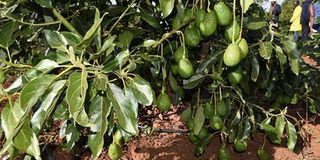Avocado farmers warned not to use unregistered pesticides

An avocado tree. The Avocado Society of Kenya has warned over use of unregistered pesticides on the crop, saying this might lead to exporters’ licenses being cancelled. PHOTO | FILE | NATION MEDIA GROUP
What you need to know:
- There are fears some companies might be suspended from exporting avocados over the use of some chemicals.
- Kenya exports avocados to Europe, United States of America and Asia, with China market coming in barely three months ago.
- PCPB Executive Officer Peter Opiyo said they will speed up the process of registration.
The Avocado Society of Kenya (ASOK) has warned over use of unregistered pesticides on the crop, saying this might lead to exporters’ licenses being cancelled.
ASOK executive officer Earnest Muthomi said already, there are fears that some companies might be suspended from exporting the fruit to various markets after issues were raised concerning the use of chemicals.
“Currently, we only have about five products that have been registered for use with avocados and this is a challenge especially when some of them are not found in the market. Use of other pesticides can result to cancellation of export license,” he said.
ILLEGAL CHEMICALS
“As of now, some of the chemicals being used on avocado trees by farmers to control pests are illegal despite their efficacy. This is because pesticides have different effects on each crop, especially the minimum residue limit (MRL),” he added.
One of the most common pests affecting avocado trees is aphids (an insect pest) with some farmers spraying the same chemical used on other crops such as coffee.
The MRL is particularly sensitive on fruits, since it refers to the minimum limit of a chemical remnant on a crop after spraying, which human beings can consume with minimal or no side effects.
EXPORTS
Kenya exports avocados to Europe, United States of America and Asia, with China market coming in barely three months ago.
Kenya exported avocados worth Sh10 billion in 2017/2018 financial year, according to data from Kenya Plant Health Inspectorate Service.
The European Union accounted for 42 percent of the market while the Middle East came second at 28 percent.
Avocados rank fourth as the most important national fruit crop and represent 17 percent of Kenya’s total horticultural exports.
The concern on use of pesticides comes hot on the heels of a deal that President Uhuru Kenyatta struck with the Chinese government on export of avocados to the Asian country which presents a huge opportunity for farmers.
EXPEDITE REGISTRATION
However, use of unregistered chemicals on the crop might deal the export opportunity a big blow should relevant authorities fail to expedite the pesticide registration process, Mr Muthomi warned.
“We are facing this challenge because in the past, avocado was of little export value. But with the current development where farmers are exporting fruits worth billions, we expect pesticide manufacturers will also respond to the demand,” Mr Muthomi noted.
Normally, before use of a certain pesticides on a crop, it has to be registered with the Pest Control Products Board (PCPB), with ASOK said to have held discussions with the board over the matter.
NO PENDING APPLICATION
PCPB Executive Officer Peter Opiyo said they will speed up the process of registration, adding that there is no pending application so far.
“Any company expressing interest is free to do so and so long as they follow the procedure and all requirements fulfilled, ours is to register the products,” Mr Opiyo said in a telephone interview.
Besides chemicals manufactured locally, PCPB also registers foreign manufacturers who are required to appoint authorised representatives in the country, importers and distributors.





